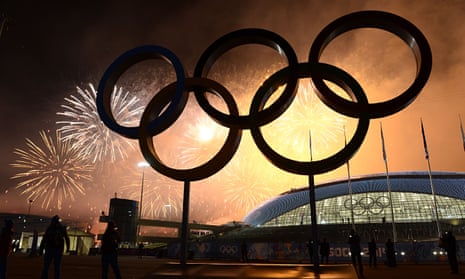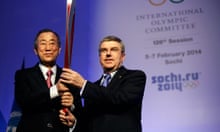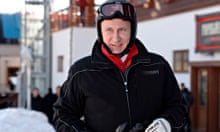After the controversy that surrounded Russia’s anti-gay laws before the Sochi 2014 Winter Games, the International Olympic Committee (IOC) has introduced a specific anti-discrimination clause to its host city contract.
In a letter to prospective bidders for the 2022 Winter Olympics informing them of changes to the contract, which acts as a binding agreement between the IOC and the winner, director of sport Christophe Dubi said the new clause would be based on principle 6 of the Olympic charter.
The clause reads: “Any form of discrimination with regard to a country or a person on grounds of race, religion, politics, gender or otherwise is incompatible with belonging to the Olympic movement.”
In the letter, Dubi informs bidders that “an express reference was included to the prohibition of any form of discrimination, using the wording of fundamental principle 6 of the Olympic charter”.
On the eve of the Sochi Olympics, the Guardian revealed that more than 50 current and former Olympians – including 12 competing in the 2014 Games – had called on the Russian authorities to reconsider new laws that banned “gay propaganda” aimed at under-18s and had led to a wave of homophobic attacks.
Some of the 52 Olympians, with dozens of medals between them and including 12 Sochi competitors, also criticised the IOC and multinational sponsors for not doing more to force Vladimir Putin’s administration to scale back the legislation. The signatories to the so-called Principle 6 Campaign – named after the clause in the Olympic charter – included the American snowboarding gold medallist Seth Wescott, the Sochi-bound Canadian biathlete Rosanna Crawford and the Australian four-man bobsled team.
Other famous former Olympians who backed the call included the tennis players Martina Navratilova and Andy Roddick, the former Leeds United footballer Robbie Rogers, and the four-time gold-medal-winning diver Greg Louganis.
The new laws, and wider concerns about Russia’s human rights record, were an issue throughout the Sochi Olympics, with UN secretary general Ban Ki-moon among those who spoke out on the issue. Russian authorities provided so-called “protest areas”, albeit well away from the Olympic park, and some athletes spoke out on the issue, though there were no high-profile protests on the podium.
The move follows a concerted campaign by a coalition of human rights organisations including All Out, Athlete Ally and Human Rights Watch. In March, more than 80,000 people signed a petition calling on the IOC to add the clause to its host city contract.
“This is a significant step in ensuring the protection of both citizens and athletes around the world and sends a clear message to future host cities that human rights violations, including those against lesbian, gay, bisexual and transgender people, will not be tolerated,” said Andre Banks, co-founder of All Out.
“This is a particularly important moment for the world’s lesbian, gay, bisexual and transgender citizens who face discrimination and persecution not only in Russia but in countries all over the world. We will continue working to make sure this change is powerfully enforced – these new rules must prevent a replay of Sochi.”
The three cities on the final shortlist for the 2022 Winter Olympics are Oslo in Norway, Almaty in Kazakhstan and Beijing in China. Before the 2008 summer Games, Beijing faced global protests over its human rights record during the torch relay while Kazakhstan has been repeatedly criticised over human rights by NGOs.
The move is likely to increase the pressure on Fifa to take a stand before the 2018 World Cup in Russia and the controversial 2022 tournament in Qatar, where homosexuality is illegal.
The Guardian revealed in June that Fifa, mired in controversy over corruption claims surrounding the 2018 and 2022 bidding processes, was considering making a country’s human rights record a factor when deciding future World Cup hosts.




Comments (…)
Sign in or create your Guardian account to join the discussion